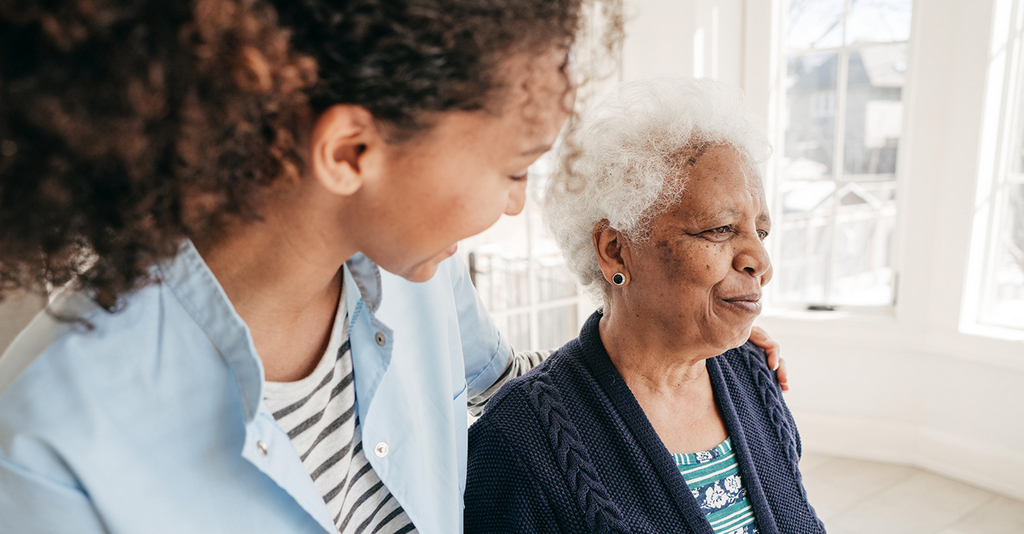[ad_1]
By Jannette J. Witmyer
Special to the AFRO
#AFROcoversCOVID
As chronicled in the 1997 film “Soul Food,” having relatives from near and far converge in Big Mama’s house to prepare, and share the culinary extravaganza that is the Sunday family dinner is tightly interwoven within the fabric of African-American culture. Those celebrations like family reunions, milestone birthdays and anniversaries, supplemented throughout the year by informal drop-ins for a meal, a hug or some change, are as much a part of Black family life as lotion. Culturally, our lives would be ashy in the absence of that familial balm.
Marie Brown is a member of one of those families whose members spend more time at mom’s than they do at home. Until recently, her mother’s home was “family central.” For Brown, along with her twin sister, two brothers, spouses and kids, grandma’s was the go-to place for family celebrations, large and small. It was also “community central,” the doorsteps that kids in the neighborhood made their way to when door keys were lost, knees scraped or they just wanted a freeze pop.

“We’re spread out [throughout Baltimore] but we spend 85 to 90 percent of our time at my mother’s house. It’s almost like we live there. We are there every day and spend the night, more often than not,” Brown says, describing her family’s closeness.
Those activities came to a screeching halt when Brown’s sister was alerted that a friend, with whom she spends considerable time, tested positive for COVID-19. As a result, Brown, her mother, sister, and her sister’s five school-aged children (14, 12, 10, seven and five) were all tested for the virus. Brown’s mother, who is diabetic and has a compromised immune system, her sister, and four of the children, tested positive.
Family roles changed, immediately. Brown is now the primary caregiver, with lots of help from her brothers and one sister-in-law. Family members who received positive results are quarantined, together, at her twin’s home, where her contact is limited to leaving supplies on the front step and waving from the car. Her 10-year-old nephew, whose results were negative, is living with Brown and her six-month-old daughter. Being split up that way is not easy for anyone.
“Normally, we don’t go a day without seeing each other, and with COVID-19 it’s been hard. I’ve never not seen my mother for five days, unless I’ve been on vacation,” she says, and adds, “It’s been one of the hardest things to do because my mother is that person in the community who takes care of all of the kids.”
As difficult as the situation is, Brown hopes that it will serve as a wake-up call to those in the African-American community who haven’t taken the virus or mandated precautions seriously and offers, “When people don’t live in your house, you really should take that [safety measures] to heart. And, if you do let anybody in your house, they should have on a mask.”
From retired social worker Stephanie Whitehurst’s perspective, convincing the family matriarch not to open her home to family and friends during this pandemic is one of the most challenging obstacles to social distancing. After working nearly 35 years in Family Support Services at Baltimore City Department of Social Services, she says that, culturally, it goes against the grain and clarifies, “I see the grandmother who’s not going to turn anybody away, no matter what, and will tell you, ‘If my son or grandbaby tells me that he needs a place to stay, I’m not going to turn him away.’”
“When you start talking about social distancing, she says ‘I hear what you’re saying, but he goes to the store for me. And, you know I’ve got arthritis, so he puts the trash out. And, these boys around here don’t bother me…’”
Whitehurst says that given those kinds of exchanges, the most that can be done is to encourage safe practices like wearing face masks, maintaining distance and washing hands as much as possible.
With little professional medical direction available to combat the virus, and the Brown family’s focus is on working to boost and strengthen their immune systems and help with breathing. So, they are consuming lots of vitamins, elderberry, zinc, vitamin D3, echinacea and tea made with ginger, turmeric and honey as an anti-inflammatory. Also, to combat her mother’s increased risk, they use a YouTube video demonstrating breathing techniques for Covid-19 patients.
As the family waits for their 14-day quarantine period to end, Brown is looking to the future. “I would just say that it goes back to wearing your mask, washing your hands and making sure that you’re disinfecting your home. More often than not, people don’t understand how important that is, making sure you’re killing germs in the home.”
Even during this difficult time, Brown sees good in the family’s story. “Are we upset that everybody has it? Are we over here in our emotions some time? Yes. But on the side of God’s grace and his mercy, he’s faithful. And, he continues to show up and show out as we go through this season,” Brown said. “Glory be to God. Nobody has passed away. Nobody is in the hospital. Nobody is on a ventilator or anything like that. That’s the good story, showing the Black community that people are surviving and that people do survive.”
Due to privacy considerations, Marie Brown is a name used to protect the family’s anonymity.
For questions and comments, the writer can be contacted at j[email protected].
[ad_2]
Source link

